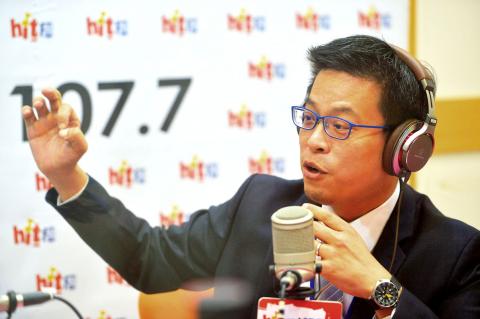The government has a strategy in place for if Taiwan were to lose all of its diplomatic allies, Presidential Office spokesman Alex Huang (黃重諺) said yesterday, but added that the nation would not succumb to China’s mounting pressure.
During a morning interview with radio show host Clara Chou (周玉蔻), Huang was asked whether President Tsai Ing-wen’s (蔡英文) administration has contemplated the possibility of being left with no diplomatic allies after losing El Salvador on Tuesday.
El Salvador is the fifth nation to switch official recognition to Beijing since Tsai took office in May 2016, following Sao Tome and Principe, Panama, the Dominican Republic and Burkina Faso, leaving the nation with 17 diplomatic allies.

Photo: CNA
“We have considered all kinds of scenarios and I think [the one you mentioned] was among them,” Huang said, but declined to reveal Tsai’s bottom line in terms of the number of allies.
Tsai’s national security team months ago received intelligence concerning El Salvador’s possible switch, which was why it examined all possible scenarios and prepared corresponding measures before Tsai embarked on her nine-day visit to Paraguay and Belize on Aug. 12, Huang added.
“They explored five or six hypothetical scenarios, including [the breakage of ties occurring] before Tsai’s visit, during her transit stops in the US, during her stay at our diplomatic allies and after her return,” he said.
Regarding the controversy surrounding Taiwan-based bakery cafe 85°C (85度C) — which declared its support for the so-called “1992 consensus” amid boycott threats from China after a store in Los Angeles served Tsai — Huang said that Tsai’s visit to the store was arranged in advance.
Tsai only visited to offer encouragement to a Taiwanese business, Huang said, adding that she found China’s reaction incredible.
Asked whether the incident would prevent Tsai from visiting overseas Taiwanese businesses, Huang said: “Some US-based Taiwanese businesspeople have actually invited the president to visit their companies in her future transit stops as a show of support.”
Tsai has never considered succumbing to Beijing’s threats, because of incidents such as China barring a choir from Nantou County’s Minhe Junior High School from performing at the World Peace Choral Festival in Vienna last month, Huang said.
“We want to make sure that our next generations are able to freely represent themselves,” he said.
The “1992 consensus” refers to a tacit understanding between the Chinese Nationalist Party (KMT) and the Chinese Communist Party that both sides of the Taiwan Strait acknowledge there is “one China,” with each side having its own interpretation of what “China” means.

DAREDEVIL: Honnold said it had always been a dream of his to climb Taipei 101, while a Netflix producer said the skyscraper was ‘a real icon of this country’ US climber Alex Honnold yesterday took on Taiwan’s tallest building, becoming the first person to scale Taipei 101 without a rope, harness or safety net. Hundreds of spectators gathered at the base of the 101-story skyscraper to watch Honnold, 40, embark on his daredevil feat, which was also broadcast live on Netflix. Dressed in a red T-shirt and yellow custom-made climbing shoes, Honnold swiftly moved up the southeast face of the glass and steel building. At one point, he stepped onto a platform midway up to wave down at fans and onlookers who were taking photos. People watching from inside

A Vietnamese migrant worker yesterday won NT$12 million (US$379,627) on a Lunar New Year scratch card in Kaohsiung as part of Taiwan Lottery Co’s (台灣彩券) “NT$12 Million Grand Fortune” (1200萬大吉利) game. The man was the first top-prize winner of the new game launched on Jan. 6 to mark the Lunar New Year. Three Vietnamese migrant workers visited a Taiwan Lottery shop on Xinyue Street in Kaohsiung’s Gangshan District (崗山), a store representative said. The player bought multiple tickets and, after winning nothing, held the final lottery ticket in one hand and rubbed the store’s statue of the Maitreya Buddha’s belly with the other,

‘COMMITTED TO DETERRENCE’: Washington would stand by its allies, but it can only help as much as countries help themselves, Raymond Greene said The US is committed to deterrence in the first island chain, but it should not bear the burden alone, as “freedom is not free,” American Institute in Taiwan Director Raymond Greene said in a speech at the Institute for National Defense and Security Research’s “Strengthening Resilience: Defense as the Engine of Development” seminar in Taipei yesterday. In the speech, titled “Investing Together and a Secure and Prosperous Future,” Greene highlighted the contributions of US President Donald Trump’s administration to Taiwan’s defense efforts, including the establishment of supply chains for drones and autonomous systems, offers of security assistance and the expansion of

Japan’s strategic alliance with the US would collapse if Tokyo were to turn away from a conflict in Taiwan, Japanese Prime Minister Sanae Takaichi said yesterday, but distanced herself from previous comments that suggested a possible military response in such an event. Takaichi expressed her latest views on a nationally broadcast TV program late on Monday, where an opposition party leader criticized her for igniting tensions with China with the earlier remarks. Ties between Japan and China have sunk to the worst level in years after Takaichi said in November that a hypothetical Chinese attack on Taiwan could bring about a Japanese